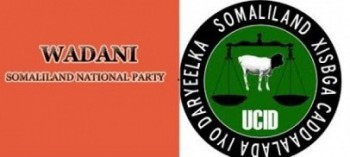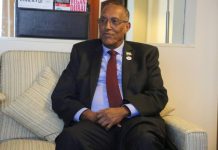 By Ismail Yusuf
By Ismail Yusuf
The upper most important development factor in any country in the world is justice and not the number of number of roads, schools or any other elements pertaining to the development. Let me one factor of injustices responsible by this administration. It was confirmed that 73 % of Somaliland work force are from one clan that, this administration consider as the chief clan of this country. Furthermore, the work forces of these ministries are also the same clan of said ministries.
The military general, police general, chief justices, attorney general, government chief auditor, the most high-ranking government positions are gifted for one clan of Somaliland society. Within what, they consider as chief clan, the most influential government miniseries such as finance foreign, education and military general are reserved for one clan of the Somaliland and this is the only in the world wherein such government positions are everlastingly reserved for one clan. the president occasionally replaces the ministries with the exception the ministries for his clan, as he consider them the most trusted ones in contrast with other ministries. The president sacks any minster who is limited doing good professional work if the minster fails to praise the president at all times. One good example for this unethical behaviour from the president, he replaced the most hard-working, honest, professionalize and capable minster, the ex-health minister, Doctor Hussein Xoog. According the public opinion both in local and overseas, Dr. Hussein is recognized as the most hard-working, most efficient, most professional, most honest and most transparent minister in cabinet, yet he was replaced. In history, this is the first minster that was substituted simply he characterizes all best traits any minster could posses. Somaliland public is nervous about why this quality of minster was replaced. Perhaps the minster is short of performing unethical job which possibly others are doing. Most of influential misters such as foreign, mineral resources and education engage political corruption making use of their government power Political corruption is the use of governmental powers by government officials for illegitimate private gain. Misuse of government power for other purposes, such as repression of political opponents and general police brutality, is not considered political corruption. Neither are illegal acts by private persons or corporations not directly involved with the government. An illegal act by an officeholder constitutes political corruption only if the act is directly related to their official duties. All forms of government are susceptible to political corruption. Forms of corruption vary, but include bribery, extortion, nepotism and embezzlement. Corruption poses a serious development challenge. In the political realm, it undermines democracy and good governance by flouting or even subverting formal processes.
Corruption in elections and in legislative bodies reduces accountable and distorts representation in policy making; corruption in the judiciary compromises the rule of law and corruption in public administration results in the unfair provision of services. More generally, corruption erodes the institutional capacity of government as procedures are disregarded, resources are siphoned off, and public offices are bought and sold. At the same time, corruption undermines the legitimacy of government and such democratic values as trust and tolerance. Corruption also undermines economic development by generating considerable distortions and inefficiency. Corruption also generates economic distortions in the public sector by diverting public investment into capital projects where bribes and kickbacks are more plentiful. Officials may increase the technical complexity of public sector projects to conceal or pave way for such dealings, thus further distorting investment. Corruption also lowers compliance with construction, environmental, or other regulations, reduces the quality of government services and infrastructure, and increases budgetary pressures on government. Corruption facilitates environmental destruction. Although even the corrupt countries may formally have legislation to protect the environment, it cannot be enforced if the officials can be easily bribed. Kickback is another form of corruption. Where corruption inflates the cost of business, it also distorts the playing field, shielding firms with connections from competition and thereby sustaining inefficient firms. Many government minsters engage kickback business. it has been reported that kickback obtained for the most of oil companies looking for drilling rights in Somaliland. A kickback is a form of negotiated bribery in which commission is paid to the bribe-taker as a quid pro quo (exchange means an exchange of goods or services). Generally speaking, the remuneration (money, goods, or services handed over) is negotiated ahead of time. The kickback varies from other kinds of bribes in that there is implied collusion between agents of the two parties, rather than one party extorting the bribe from the other. The purpose of the kickback is usually to encourage the other party to cooperate in the illegal scheme.
The most common form of kickback involves a vendor submitting a fraudulent or inflated invoice (often for goods or services which were not needed, of inferior quality, or both), with an employee of the victim company assisting in securing payment. For his or her assistance in securing payment, the individual receives some sort of payment (cash, goods, services) or favour (the hiring of a relative, employment, etc.).”Kickback brokers” are individuals who may not receive the kickback personally, but who help link the individual or company providing the goods or services with individuals capable of assisting with the illegal payments. For helping to link the two colluding parties, either or both parties may make a payment to this “broker. Kickbacks are one of the most common forms of government corruption. In some cases, the kickback takes the form of a “cut of the action,” and can be so well known as to be common knowledge and even become part of a nation’s culture. For example, in Indonesia president Suharto was publicly known as “Mr. Twenty-Five Percent” because he required that all major contracts throughout the nation provide him with 25 percent of the income before he would approve the contract. The current Pakistani president is known as Mr. 10 %. Some ministries also takes unknown royalties mostly for oil companies seeking drilling rights. A royalty is a usage-based payment made by one party (the licensee) to another (the “licensor”) for the right to ongoing use of an asset. Royalties are typically agreed upon as a percentage of gross or net revenues derived from the use of an asset or a fixed price per unit sold of an item of such, but there are also other modes and metrics of compensation. A royalty interest is the right to collect a stream of future royalty payments, often used in the oil industries to describe a percentage ownership of future production or revenues from given leasehold, which may be divested from the original owner of the asset.It is not power that corrupts but fear. Fear of losing power corrupts those who wield it and fear of the scourge of power corrupts those who are subject to it.” to oppose corruption in government is the highest obligation of patriotism.”
The duty of youth is to challenge corruption. Money and corruption are ruining the land, crooked politicians betray the working man, pocketing the profits and treating us like sheep, and we’re tired of hearing promises that we know they’ll never keep. Corruption is the enemy of development, and of good governance. It must be got rid of. Both the government and the people at large must come together to achieve this national objective. Corruption, embezzlement, fraud, these are all characteristics which exist everywhere. It is regrettably the way human nature functions, whether we like it or not. What successful economies do is keep it to a minimum. No one has ever eliminated any of that stuff. Unfortunately, corruption is widespread in government agencies and public enterprises. Our political system promotes nepotism and wasting money. This has undermined our legal system and confidence in the functioning of the state. One of the consequences is that many citizens don’t pay their taxes. The great constitutional corrective in the hands of the people against usurpation of power, or corruption by their agents is the right of suffrage; and this when used with calmness and deliberation will prove strong enough. We are all aware that corruption is pervasive. It operates at every level. The poor may carry its greatest burden, but it is an affliction that every Indian is desperate to be rid of. When leaders are no longer beholden to the people who elected them, corruption results and the recruitment of extremists becomes easier.
With regards tribalism, many minsters of the cabinet are loyal to the subjects their clan rather than the whole nation. Tribalism is the state of being organized in, or advocating for a tribe .tribalism may also refer in popular cultural terms to a way of thinking or behaving in which people are more loyal to their tribe than to their friends, their country, or any other social group. One good example for the minsters when dispute with respect power struggle erupt between the minister of information and national TV manger, all the minsters of a same clan with the TV manager sided with him and the minster lost the argument as the confrontation was one minister against six ministries. We all know tribalism is a barrier to progressive democratic dialogue, yet this administration is famous for tribalism practice.
To promote this very important democratic idea, the system must allow honest, open and unbiased dialogue about the future of the Somaliland society. For any nation to survive the sophistication of democracy it must allow these values to reign supreme.” That is how a democracy survives. That is how the collective dreams and the collective aspirations of any society are achieved. When our value is not the guiding principles of any democratic society, the ultimate losers are the common citizens. On the other hand, the winners are the current crop of leaders and politicians who have zero interest in improving the lives of common somalilanders. Somali-land democratic transition is back in the spotlight. The concern is no longer the stranglehold of autocrats, but the hijacking of the democratic process by tribal politics. The challenge to democracy in Somaliland is not the prevalence of tribalism diversity, but the use of identity politics to promote narrow tribal interests. It is tribalism. Some government leaders exploit tribal loyalty to advance personal gain, parochial interests, patronage, and cronyism. But tribes are not built on democratic ideas but thrive on zero-sum competition. As a result, they are inimical to democratic advancement. In essence, tribal practices are occupying a vacuum created by lack of strong democratic institutions.
Tribal interests have played a major role in armed conflict and civil unrest in many parts of Africa. Tribalism is another form of corruption. Tribalism implies the possession of a strong cultural or ethnic identity that separates one member of a group from the members of another group. Based on strong relations of proximity and kinship, members of a tribe tend to possess a strong feeling of identity. Objectively, for a customary tribal society to form there needs to be ongoing customary organization, enquiry and exchange. It is very sad that at 21stcentury, in our country, yet some government officials have not immigrated from tribalism.. in conclusion, the only time we can defeat this government that is famous for the unethical traits listed in the above is at the time casting our votes, therefore, let us unit against them, so that we can form a government free from all the unprincipled attributes revealed in the above.
Ismail Yusuf.
























